Keynote Speakers
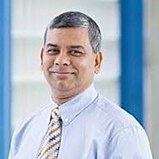
Kalyanmoy Deb
Koenig Endowed Chair Professor, Electrical and Computer Engineering
Director, Computational Optimization and Innovation (COIN) Laboratory
Michigan State University, USA
Brief Speaker Bio :
Dr Kalyanmoy Deb is Koenig Endowed Chair Professor at Department of Electrical and Computer Engineering in Michigan State University, USA.
Prof. Deb's research interests are in evolutionary optimization and their application in multi-criterion optimization, modeling, and machine learning. He has been a visiting professor at various universities across the world including University of Skövde in Sweden, Aalto University in Finland, Nanyang Technological University in Singapore, and IITs in India. He was awarded IEEE Evolutionary Computation Pioneer Award for his sustained work in EMO, Infosys Prize, TWAS Prize in Engineering Sciences, CajAstur Mamdani Prize, Distinguished Alumni Award from IIT Kharagpur, Edgeworth-Pareto award, Bhatnagar Prize in Engineering Sciences, and Bessel Research award from Germany. He is fellow of IEEE, ASME, and three Indian science and engineering academies. He has published over 545 research papers with Google Scholar citation of over 149,000 with h-index 123. He is in the editorial board on 18 major international journals. More information about his research contribution can be found from https://www.coin-lab.org.
Topic:
Multi-criterion Search and Optimization Using Evolutionary Computation
Abstract: Most real-world search and optimization problems must ideally be solved for multiple conflicting criteria to have a comprehensive understanding of different solution scenarios. However, due to lack of suitable solution methods, multiple criteria were mostly converted to a single composite function and optimized. The population approach of evolutionary computation methods facilitates in finding multiple Pareto-optimal solutions in such problems. In this keynote, the advantages of treating such problems as truly multi-criterion problems will be highlighted. The lecture will also highlight recent advances on the topic.

Simon See
Senior Director, Nvidia
AI Technology Center, Singapore
Brief Speaker Bio :
Prof. Simon See is currently the Senior Director, Nvidia, AI Technology Center, Singapore. He is also a Professor and Chief Scientific Computing Officer in Shanghai Jiao Tong University. Previously Prof See is also the Chief Scientific Computing Advisor for BGI (China) and has a position in NanyangTechnological Univ (Singapore) and King-Mong Kung Univ of Technology (Thailand). He is currently involved in a number of smart city projects, especially in Singapore and China. His research interests are in the area of High Performance Computing, Big Data, Artificial Intelligence, machine learning, computational science, Applied Mathematics and simulation methodology.
Prof. See is also leading some of the AI initiatives in Asia Pacific. He has published over 200 papers in these areas and has won numerous awards in the field.Prof See is also a member of SIAM, IEEE and IET. He is also a committee member of more than 50 conferences.
Prof. See graduated from University of Salford (UK) with a PhD in electrical engineering and numerical analysis in 1993. Prior to joining NVIDIA, Dr See worked for SGI, DSO National Laboratory of Singapore, IBM, International Simulation Ltd (UK), Sun Microsystems and Oracle. He is also providing consultancy to a number of national research and supercomputing centres.
Topic
A Symbiotic Relation : AI and Simulation
Abstract:
Recently statistical machine learning which is a subset of Artificial Intelligence has made great progress. The accuracy of computer vision, automatic speech recognition , image processing and language translation using machine learning and deep learning have already surpass human capability. However these technologies required huge amount of data to train. The size of the neural network has grown a few order in term of size. In order to achieve higher level artificial intelligence, we need to develop algorithms that can be trained with much smaller data size or simulated model. Also simulation models are getting more complex and thus computational hungry. Moore’s law will not able to meet the computational need of the new simulation requirement. In this talk, the author discusses about the state of art AI algorithm, application and how simulation is being used for Artificial General Intelligence and Artificial Intelligence can be used to advance and reduce the computational requirement of large scale simulation model.
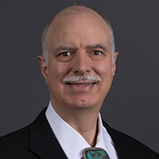
Donald Wunsch
Mary K. Finley Missouri Distinguished Professor, Electrical and Computer Engineering
Missouri University of Science & Technology, USA
Brief Speaker Bio :
Donald Wunsch is the Mary K.. Finley Missouri Distinguished Professor at Missouri University of Science & Technology (Missouri S & T). Prof. Wunsch is now a Program Director at the National Science Foundation via an interagency personnel assignment from his university.
Earlier employers were: Texas Tech University, Boeing, Rockwell International, and International Laser Systems.
His education includes:
Executive MBA - Washington University in St. Louis,
Ph.D., Electrical Engineering - University of Washington (Seattle),
M.S., Applied Mathematics (same institution),
B.S., Applied Mathematics - University of New Mexico.
Key research contributions are: Clustering, including hierarchical clustering and biclustering; Adaptive resonance and Reinforcement Learning architectures, hardware and applications; Neurofuzzy regression; Traveling Salesman Problem heuristics; Smart Grid; Robotic Swarms; and Bioinformatics. He has produced 21 Ph.D. recipients in Computer Engineering, Electrical Engineering, Systems Engineering, and Computer Science; many M.S. students in those disciplines and also Statistics; and has over 500 publications including eleven books.
He is an IEEE Fellow and previous INNS President, INNS Fellow and Senior Fellow 07 - present, and served as IJCNN General Chair, and on several Boards, including the IEEE Neural Net Council, International Neural Networks Society, and the University of Missouri Bioinformatics Consortium. He chaired the Missouri S&T Information Technology and Computing Committee, a Faculty Senate Standing Committee. He received the 2015 INNS Gabor Award for neural networks in engineering and the 2019 INNS Ada Lovelace Service Award.
Topic
The need for real-time quality metrics in unsupervised learning
Summary:
Unsupervised learning (also known as clustering) has always been challenging due to the scarcity of ground truth. Otherwise, one could use supervised or reinforcement learning. This amplifies the importance of validating the quality of clustering results. Many techniques exist to accomplish this. Until recently, cluster validation was a batch operation. Now it is possible and advisable to perform online validation of clustering results. This talk will explain why and how to do so.
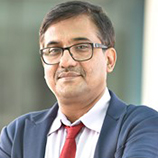
Pushpak Bhattacharyya
Professor, Department of Computer Science & Engineering, IIT Bombay
FNAE, Abdul Kalam Fellow
Former Director, IIT Patna
Distinguished Alumnus, IIT Kharagpur
Former President Association for Computational Linguistics
Former Vijay and Sita Vashee Chair Professor, IIT Bombay
Brief Speaker Bio :
Prof. Pushpak Bhattacharyya, Fellow of National Academy of Engineering and A.P.J. Abdul Kalam National Fellow, is former Director of IIT Patna (2015-20) and Professor of Computer Science and Engineering Department IIT Bombay where he also held the Vijay and Sita Vashi Chair Professorship. Prof. Bhattacharyya is currently the Professor-Incharge too of Data and Information Sciences Lab under the Institute of Eminence activity of IIT Bombay. He was raised in the picturesque town of shillong in Meghalaya where he was the state topper in both class 10th (1977) and class 12th (1979) examinations. He was educated in IIT Kharagpur (B.Tech, 1984; also chosen as its Distinguished Alumnus in 2018), IIT Kanpur (M.Tech, 1986) and IIT Bombay (PhD, 1994). He has been visiting scholar and faculty in MIT, Stanford, UT Houston and University Joseph Fouriere (France). Prof. Bhattacharyya’s research areas are Natural Language Processing, Machine Learning and AI (NLP-ML-AI). His lab called "Center for Indian Language Technology" (CFILT) at IIT Bombay is known internationally for its contribution to NLP and ML. In IIT Patna too, the lab called "Center of Excellence in Natural Language Processing" is gaining visibility in the country and abroad.
Prof. Pushpak Bhattacharyya has worked in all areas of Natural Language Processing- machine translation, sentiment and opinion mining, cross lingual search and multilingual information extraction. He combines linguistics, cognitive science and machine learning in a unique way. He has published more than 300 research papers. Multilingual Lexical Knowledge Bases and Projection and Computational Sarcasm are his reasearch trail-blazers. Author of the text book ‘Machine Translation’ Prof. Bhattacharyya has shed light on all paradigms of machine translation with abundant number of examples from Indian Languages. Two recent monographs by him called 'Investigations in Computational Sarcasm' (with Dr. Aditya Joshi) and 'Cognitively Inspired Natural Language Processing- An Investigation Based on Eye Tracking' (with Dr. Abhijit Mishra) describe cutting edge research in NLP and ML.
Prof. Bhattacharyya has guided more than 250 students (PhD, masters and Bachelors); he is loved by his students for his friend-phillosopher-guide approach to mentorship. Students mentored by Prof. Bhattacharyya are faculty members in IITs, NITs, IIITs and Universities, and also are industry leaders and members of top research labs.
Ministries, Government organizations and leading industries have benefitted from Prof. Bhattacharyya's expertise. The list includes MEITY, MHRD, MoC, MEA, NITI Aayog, CDAC, Accenture, Elsevier, Microsoft, IBM, Honeywell, Samsung, HCL, LG, Emirates Airlines, and startups like Bluepool, Scribetech, FreshGravity etc. He has led government and industry projects of international and national importance. Sponsored projects and consultancy projects executed by Prof. Bhattacharyya run into multiple crores.
Over the years, Prof. Bhattacharyya has been rendering professional service in various capacities. He has been President (2016-17) of Association of Computational Linguistics (ACL) the highest International body defining standards of and propagating Computational Linguistics. He is currently serving as Chairman of Committee for Standardization in Artificial Intelligence, set up by Bureau of Indian Standards under Ministry of Consumer Affairs in 2018, whose members include IITs and IISc, CSI, MEITY, NITI Ayog, CAIR DRDO and leading industries like TCS, Google India, IBM Software, Samsung, Intel Research, and Microsoft Research. He has been a founding member (2017) of Asian Association for Computational linguistics (AACL) and South Asian Association for Language Processing (SAALP) (2005). He organized one of the major international conferences on computational linguistics- COLING 2012 in Mumbai.
Prof. Bhattacharyya has been a propagator of NLP, its foundations, state of art and Indian Language Technology. Starting with educational institutes in and around Mumbai, he has lectured in IITs, IISc, NITS, IIITs, MIT, Stanford, University of Chicago, Oxford University, Grenoble University, University of Texas at Houston etc. Similarly, he has delivered invited talks in industries and research labs like IBM, Microsoft, Yahoo, Apple, NVIDIA, Accenture, Honeywell, Adobe, CDAC, CDOT and others.
Prof. Bhattacharyya's research has gained national and international visibility. His work on Computational Sarcasm with his students featured in The TIMES London Edition, 19th Sept, 2017 (Link) and also in Hindustan Times, 22nd August, 2018 (Link). The deep learning based sarcasm research also featured in MIT Technology Review and ACM Tehnology News (Link). A recent web analysis places Prof. Bhattacharyya in the list of most prolific researchers on NLP and ML for the period 2012-17 (Link). Another such very recent web analysis places Prof. Bhattacharyya amongst top 10 machine learning researchers of the country (Link).
Prof. Bhattacharyya is Fellow of Indian National Academy of Engineering (FNAE) (elected 2015). For sustained contribution to technology he received the Manthan Award of Ministry of IT (2009), P.K. Patwardhan Award of IIT Bombay (2008) and VNMM Award of IIT Roorkey (2014). He is Distinguished Alumnus Awardee (2018) of IIT Kharagpur. In 2020, he was conferred the prestigiuos Abdul Kalam Technology Innovation National Fellowship.
Title of Talk
AI for Society: the Role of Natural Language Processing
Abstract:
In this talk we will present our two decade long work on many areas of natural language processing like machine translation, sentiment and emotion analysis, information extraction and so on. Machine Learning and data have played a very important role in this research. The role of NLP and ML in societal benefit is supreme. We will discuss a few cutting edge and impactful applications in this talk.
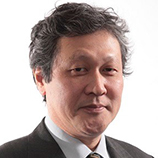
Akira Hirose
Professor, Department of Electrical Engineering and Information Systems
The University of Tokyo, Japan
Brief Speaker Bio :
Akira Hirose received the Ph.D. degree in electronic engineering from the University of Tokyo in 1991. In 1987, he joined Research Center for Advanced Science and Technology (RCAST), the University of Tokyo, as Research Associate. In 1991, he was appointed as Instructor at RCAST. From 1993 to 1995, on leave of absence from the University of Tokyo, he joined the Institute for Neuroinformatics, University of Bonn, Bonn, Germany. He is currently Professor with the Department of Electrical Engineering and Information Systems, the University of Tokyo. The main fields of his research interests are wireless electronics and neural networks. In the fields, he published several books such as Complex-Valued Neural Networks, 2nd Edition (Springer 2012). He served as the Founding President of Asia-Pacific Neural Network Society (APNNS) (2016), President of Japanese Neural Network Society (JNNS) (2013-2015), Vice President of the IEICE Electronics Society (ES) (2013-2015), Editor-in-Chief of the IEICE Transactions on Electronics (2011-2012), Associate Editor of journals such as the IEEE TRANSACTIONS ON NEURAL NETWORKS (2009-2011), IEEE GEOSCIENCE AND REMOTE SENSING NEWSLETTER (2009-2012), Chair of the Neurocomputing Technical Group in the IEICE, Founding Chair of the IEEE CIS NNTC Complex-Valued Neural Network Task Force (2010-), Governing Board Member of APNNA/APNNS (2006-), IEEE Geoscience and Remote Sensing Society (GRSS) All Japan Chapter Chair (2013-2015) and IEEE Computational Intelligence Society (CIS) All Japan Chapter Chair (2017- 2018). He also served as the General Chair of Asia-Pacific Conference on Synthetic Aperture Radar (APSAR) 2013 Tsukuba, International Conference on Neural Information Processing (ICONIP) 2016 Kyoto, and International Geoscience and Remote Sensing Symposium (IGARSS) 2019 Yokohama. Dr. Hirose is a Fellow of the IEEE and the IEICE, and a member of JNNS and APNNS.
Title of Talk
Complex-valued neural networks for channel prediction in mobile communications
Abstract:
Complex-valued neural networks (CVNN) have excellent generalization ability in dealing with coherent data. This ability is widely useful in electronics and computing. In this keynote, we focus on their applications in channel prediction in mobile communications including basic ideas, the fundamentals in dynamics and recent advances such as regularization.
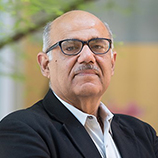
Chandrajit Bajaj
Computational Applied Mathematics Chair in Visualization
Professor of Computer Science
Director of Center for Computational Visualization
The University of Texas at Austin, USA
Brief Speaker Bio :
Dr. Chandrajit Bajaj received his Bachelor of Technology degree in Electrical Engineering from IIT Delhi in 1980. He received his Ph.D. degree in Computer Science from Cornell University in 1984.
Dr. Chandrajit Bajaj is presently the Director of the Computational Visualization Center, at the University of Texas at Austin. He is also Professor of Computer Sciences at the University of Texas at Austin since 1997 and he also holds the Computer Applied Math (CAM) Chair of Visualization since 1997.
Dr. Chandrajit Bajaj was a faculty member in the Computer Science department at Purdue University from 1984 and became the Director of Image Analysis and Visualization Center in 1996. In 1997 he was recruited by the University of Texas, Computer Science Department and the then Texas Institute of Computational and Applied Mathematics, to establish a center in computational data analysis and visualization and be its founding director.
Dr. Chandrajit Bajaj is Fellow of the American Association for the Advancement of Science, Fellow of the Institute of Electrical and Electronics Engineers (IEEE), Fellow of the Society of Industrial and Applied Mathematics (SIAM), and also Fellow of the Association of Computing Machinery (also known as ACM), which is the world’s largest education and scientific computing society.
Dr. Chandrajit Bajaj has won the University of Texas Faculty research award, the Dean Research Assignment award, and also thrice won the University of Texas, Institute of Computational Engineering and Sciences, Moncreif Grand Challenge research award. He has also received a Collaborative Teaching Award of the Architecture Department at the University of Texas.
Dr. Chandrajit Bajaj is also committed to being an international bridge and interdisciplinary sciences and engineering collaborator for institutes and universities pning several countries in Asia and Europe.
Dr. Chandrajit Bajaj’s main pursuit is focused on the algorithmic and computational mathematics underpinnings of Imaging and Geometry Data Sciences, Computer Graphics, Bio-Informatics and Visualization with applications stemming from bio-medical engineering, physical and chemical sciences and bio-inspired architecture. He is committed to the field of computational and predictive medicine. He designs and implements scalable solutions for forward and inverse problems in microscopy, spectroscopy and biomedical imaging; constructing spatially realistic and hierarchical phenomenological models, development of fast high- dimensional search/scoring engines for predicting energetically favourable multi-molecular and cellular complexes; and statistical analysis and interrogative visualization of neuronal form-function.
Topic:
Learning Rank-Ordered Intelligent Search Policies with Minimal Uncertainty
Abstract:
Ranking is used for importance-based information categorization in a wide array of search and scoring problems. By prioritizing search for high-ranked information, various sample-efficient, cost balanced exploration - exploitation policies can be learned leading to early successful task termination with minimal uncertainty. Early task termination with quantified uncertainty is particularly important when dealing with search domains with extremely large state spaces, such as giga-pixel images or simulation data with millions of grid points. In this talk I shall describe a multi-agent reinforcement learning (RL) based approach that balances uncertainty in ranking (exploitation) and importance sampling for new evidence (exploration). Several machine learning with task guarantee challenges remain, and Ill address them as well.
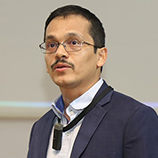
Kiran R
Partner, Head of Data Sciences as a Service (DSaaS) Innovation & Operations Center, MCDS, Cloud & AI
Microsoft
Brief Speaker Bio :
Dr Kiran is the Partner, Head of Data Sciences as a Services (DSaaS) Innovation Operations Center for Microsoft Cloud Data Sciences (MCDS) in Azure at Microsoft with teams across Bangalore, Seattle, Israel and Noida. He is an executive leader driving teams across ML Development, ML Ops, Applied ML Research, Data Sciences Foundations, Digital, Automation, Platforms, Standards, Community & Governance. In his prior role at VMware, he was the Senior Director and Global Head of Data Sciences with teams across Bangalore, Bulgaria, Austin and Palo Alto. At VMware, he drove concept-to-completion projects across R&D, IT, Sales, Marketing, Pricing, Partner, E-commerce, Audit and Finance. Dr Kiran has held leadership roles at Flipkart, Amazon and Dell. He was awarded the “India Innovator of the Year” by Michael Dell in person in 2012. Kiran is one of the ~100 Kaggle Competitions Grandmaster and was ranked 7 among the top data miners WW on Kaggle. He is also the winner of the KDD Data Mining Cup in 2014. He has accepted papers in top journals like Expert Systems with Applications. He has 7 granted & filed US Patents in Machine Learning. Kiran has a PhD from IIM Lucknow, a MBA from IIM Kozhikode and is a computer science engineer.
Topic:
Intersection of Data Sciences & Business: A practitioner view
Abstract:
In this talk, we will first cover the changing landscape in the business & how machine learning is increasingly driving decision making. A detailed perspective on data sciences, including a concept to completion framework for Machine Learning, will be presented. We will then cover the various applications of data sciences in both B2B & B2C, illustrating the differences & opportunities. The different challenges posed by problems across domains will be presented, with perspectives on how to address them. The concepts will be illustrated through case studies, with details on how adoption is driven by experimentation.
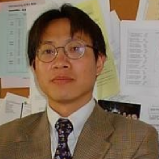
Liming Chen
Distinguished Professor, Department of Mathematics and Computer Science
Ecole Centrale de Lyon, University of Lyon, France
Brief Speaker Bio :
Liming Chen is a distinguished Professor at the Department of Mathematics and Computer Science, Ecole Centrale de Lyon, University of Lyon, France. He received his BSc in Mathematics and Computer Science from the University of Nantes in 1984, his MSc and PhD in computer science from the University Pierre and Marie Curie Paris 6 in 1986 and 1989 respectively. He was an associate professor at the Université de Technologie de Compiègne before he joined Ecole Centrale de Lyon as Professor in 1998. He served as the Chief Scientific Officer in the Paris-based company Avivias from 2001 to 2003, and the scientific multimedia expert in France Telecom R&D China in 2005. He was the head of the Department of Mathematics and Computer science from 2007 through 2016. His current research interests include computer vision, machine learning, and multimedia with a particular focus on robot vision and learning since 2016. Liming has over 300 publications and successfully supervised over 40 PhD students. He has been a grant holder for a number of research grants from EU FP program, French research funding bodies and local government departments. Liming has so far guest-edited 5 journal special issues. He is an associate editor for Eurasip Journal on Image and Video Processing, area editor for Computer Vision and Image Understanding and a senior IEEE member.
Topic:
Simulation empowered instance aware self-supervised learning for adaptive bin picking
Summary:
Dexterous manipulation of objects is a core task in robotics. However, despite years intensive research, because of the design complexity needed for robot controllers even for simple manipulation tasks for humans, e.g., pouring a cup of tea, robots currently in use are mostly limited to specific tasks within a known environment. State of the art research on robotic manipulation is based on deep learning but require large amount of annotated data which are expensive to obtain. In this talk, I will introduce the scientific challenges in robotic manipulation, overview state of the art and present our last research achievement in simulation empowered object aware self-supervised learning for a specific task of bin picking.
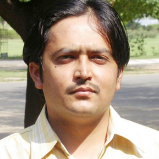
Jayadeva
Institute Chair Professor and Head,
Department of Electrical Engineering
IIT Delhi
Brief Speaker Bio :
Dr. Jayadeva is an Institute Chair Professor at IIT Delhi and Head of the EE department. Notable work includes the Twin Support Vector Machine, that has over 1200 Google Scholar citations; it is the subject of many survey papers. He received best paper awards for two conference and one journal paper; one paper was listed on Neurocomputing’s Top 25 Hotlist. His group was amongst the first worldwide to design and realize a SVM based A/D converter on chip (2006). Another 2015 chip is, to the best of knowledge, the first ant colony optimization algorithm on silicon. His co-authored rare cell detection algorithm in Nature Communications (2018) discovered a new cell subtype. He was a program chair for VLSI Design 2019, and has been an invited speaker at multiple fora. He has US patents on A/D conversion, a method for assessing pronunciation abilities, and optimization free chromatography. He is a co-author of the books “Numerical Optimization with Applications”, and “Twin Support Vector Machines: Models, Extensions, and Applications” (Springer, 2017).
Topic:
Minimizing Model Complexity: How to learn small models using the Minimal Complexity Machine
Summary:
Simple models generalize well. We discuss how Minimal Complexity Machines, that minimize a bound on the VC dimension, work. The MCM has evolved to a large family of approaches that have also been extended to deep learning. The use of such methods can provide model size reductions of 300x or more. Learning sparse models improves interpretability, and is of importance when models need to be executed on resource constrained platforms such as IoT devices or smartphones.
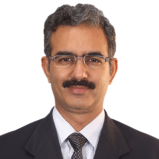
Pankaj Priyadarshi
Division Head, Aerodynamics Configuration Design Division
Vikram Sarabhai Space Centre (VSSC)
Indian Space Research Organization (ISRO)
Brief Speaker Bio :
Pankaj Priyadarshi received his B.E. degree in aeronautical engineering from Punjab Engineering College (PEC), Chandigarh, India in 1991 and M.E. degree in Aerospace engineering from Indian Institute of Science, Bangalore, India. He obtained his PhD degree from Indian Institute of Technology, Kanpur, India.
He has been working in Vikram Sarabhai Space Centre (VSSC), Indian Space Research Organization (ISRO) from 1992 and currently holds the position of Scientist/Engineer 'G' and Head of Aerodynamic Configuration Design Division in the Aeronautics Entity. He was deputed to Indian Institute of Space Science and Technology, Trivandrum, India as an Adjunct Professor for a period of 5½ years from 2010 onward. His current research interests include computational and experimental aerodynamics, flight mechanics, and design optimization, especially Multi-disciplinary Multi-objective Design Optimization.
He was awarded the ISRO-ASI Young Scientist Award in 2006 and the ISRO Team Excellence Award in 2008.
Topic:
Multi-objective evolutionary optimisation for Aerospace Vehicle Design
Summary:
Conceptual design of aerospace vehicles is a highly interdisciplinary problem with many and often conflicting objectives. The design space is often large with nonlinear constraints. The talk will concentrate on highlighting the use of multi-objective evolutionary optimisation to search for innovative and efficient solutions in the design space.
